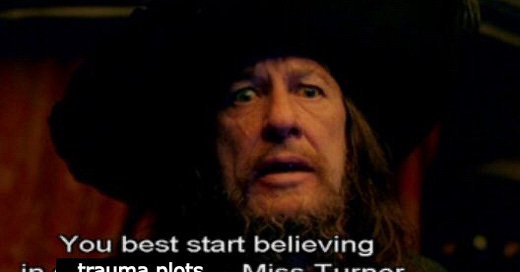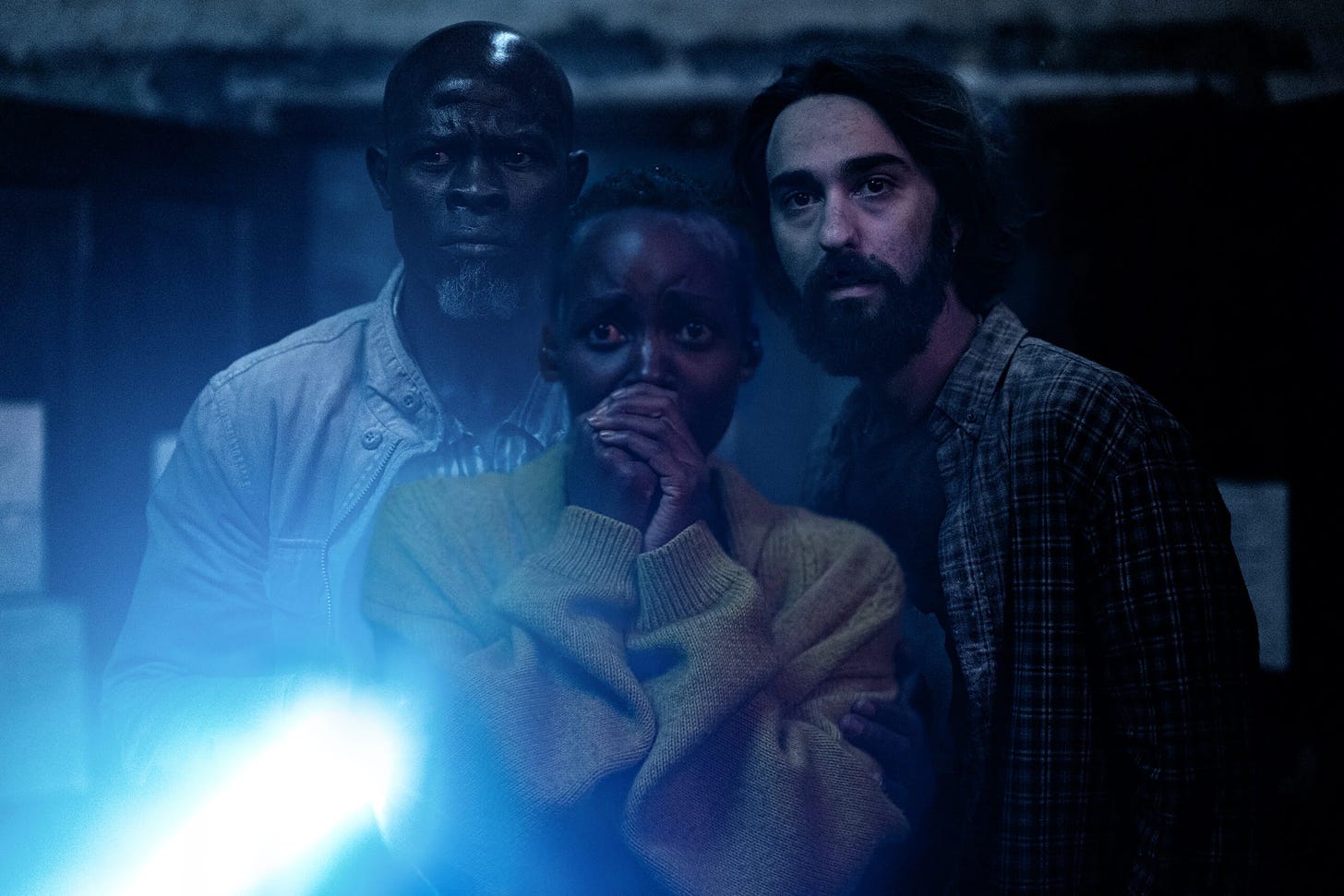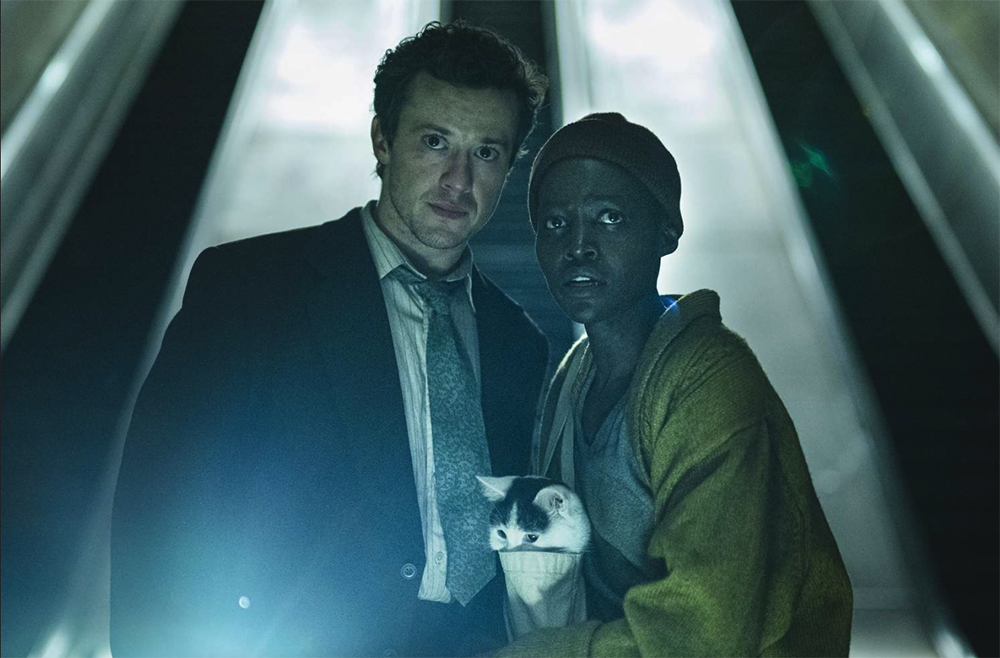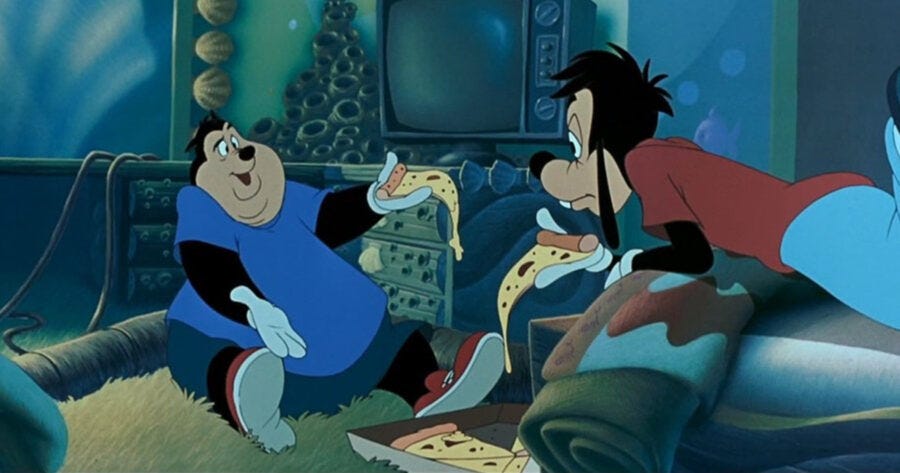The trailer for A Quiet Place: Day One indicated that it would be the latest to follow in the time-honored tradition of the alien summer blockbuster, hallowed ground tread by the likes of Alien, War of the Worlds, Nope, and E.T. The Extra-Terrestrial. But as I discovered a few minutes into my ill-fated watch, A Quiet Place: Day One isn’t an alien movie. It’s a trauma plot movie.
If you are unfamiliar with the term Parul Sehgal coined back in 2021, “trauma plot” refers to the contemporary practice of saddling characters with histrionic backstory. Cruella’s (2021) desire to turn puppies into clothing isn’t vanity; her mother was killed in a freak Dalmatian attack. The Joker’s (2019) hatred of Batman isn’t just psychosexual obsession; his mom alleges mistreatment by the Wayne family, and he was tormented by three employees/Sondheim superfans of the Wayne company. The notion that we did not just fall out of a coconut tree, or that one’s past informs one’s present, isn’t new, but the idea that every character detail must have a Rosebud-esque connection to one’s innermost self has become inescapable.
Despite featuring many of my interests (puppets, cats, yellow costumes, the character acting of Djimon Hounsou), A Quiet Place: Day One is a miserable lore slog. The Quiet Place series has a mildly interesting premise — what if horror, a genre that has been dominated by screaming since the advent of the talkies, was silent again — but it can’t survive the scrutiny of a full-on action horror franchise. In place of forward momentum, we’re riddled with generic tragic backstory for our central character, Sam (Lupita Nyong’o, girl what happened?).
An ex-poet and cynical hospice patient, Sam’s only goal for her remaining time on the coil is to get a last slice of real New York pizza with her cat, Frodo. What appears to be a joyfully nihilistic decision with Harold and Kumar-esque simplicity is immediately imbued with melodramatic resonance. This is not regular pizza, this is backstory pizza — she ate this pizza with her dead dad, who had the same cancer she is presently dying of. Sam’s sweater is a backstory sweater — again, it’s her dead dad’s, and he wears it in the photo she keeps of him! Sam’s presumably dead Black mom is not mentioned, but one can only assume she died trying to save Sam’s cat from a terrible poetry accident and that Frodo the cat is named after her, not the famous hobbit. With the help of her newly-acquired white sidekick, law student Eric, Sam learns to truly live again. And if you haven’t already picked up on these themes about furiously edging on your love for the world, we get an epistolary monologue from Sam about how, sigh, ironic it is to feel alive when the world is ending, alongside a needle drop of, not kidding, Nina Simone’s “Feeling Good.” I guess they couldn’t get the rights for “All You Need Is Love.”
But A Quiet Place: Day One is not the only trauma girl movie kicking around the theaters right now. There’s also Maxxxine, which asks questions like, “what happens when you run out of pastiche?” and “what if Christopher Moltisanti got to write and direct a movie?” Maxxxine is nakedly about trauma, with copious flashbacks to scenes from X, the first film in this sloppily constructed trilogy, and unnecessary elaborations on Maxine’s evangelical childhood. Likewise, I criticized Furiosa for using past victimhood as its female lead’s sole personality trait. We learn immediately in The Watchers that Mina’s only hobbies are vaping and expressing guilt about the car accident that killed her mother.
If you can believe women are more than just victims, it’s possible to make a movie about female childhood without making it a trauma pizza movie. The other recent exhausting horror pastiche, Longlegs, has a comically convoluted backstory about religious trauma and maternal secrets — but it also has a lead character with a visible identity grounded in an undeservedly solid performance from Maika Monroe. Monroe plays Lee with a sharp, jittery wit that alludes to a painful upbringing without announcing a catalog of justified grievances.
During this summer of trauma blockbusters, I keep thinking about Mads Mikkelsen’s 2020 dark comedy that wasn’t Another Round. Riders of Justice (streaming on Hulu). Mikkelsen plays Markus, a soldier who returns home to care for his daughter after his wife is killed in a train collision. When a survivor of the accident tells Markus he suspects that the collision was not an accident but a deliberate attack by a powerful crime syndicate, Markus goes on a rampage. But during his crusade, the movie offers doubt, not righteousness. What if Markus’s information is incorrect? If the collision was, as reported, an accident, and his wife was not a victim of gang violence? What if she was a casualty of chance? What if we can’t tie every individual choice and preference and decision in our life to a single experience? What if some things don’t mean anything? What if it all is truly just random?
A filmmaking landscape dominated by lore and franchise has made it uncomfortable to even gesture at experimenting with narrative uncertainty. Even movies that will never become major properties are averse to leaving anything on the table. Movie watchers are increasingly distracted, we’re told. We can’t be trusted with any piece of information that doesn’t have an immediately obvious connection to the A-plot.
But cinematic ephemera is what makes movies interesting (and is why I started this newsletter). It’s the tiny, inconsequential choices that make films compelling and give characters specificity. Would Reservoir Dogs (1992) be improved if Mr. Pink gave a monologue about how he doesn’t tip because a good tipper ran the psychiatric ward he escaped from? Would A Goofy Movie (1995) have more pathos if it was revealed that Max’s mom died in a car accident buying him a Powerline cassette?
Not every movie needs a fan wiki. Most things are better left unsaid. Sometimes a really good slice of pizza is just a really good slice of pizza.








Every movie is about something that happened before the film began now. It's a lazy way to add pathos to a character without working for it by creating decisions for them to make.
ZOMG this helps clarify one of the (many) things I hated about SPECTRE, the unneeded cramming of jilted brother being the reason behind all Bond's previous movie villains. Used to be that James Bond's job was dealing with random crazy people, now it, too, has to be about the trauma of his dead parents and such. Blergh.